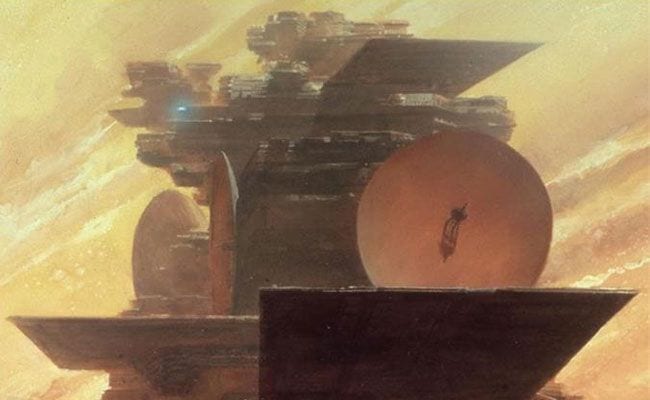
This year marks the 50th anniversary of the founding of the Nebula Awards, the Science Fiction and Fantasy Writers of America’s annual series of prizes for the best sci-fi published in the USA, and is one of the most prestigious awards in sci-fi circles. This year’s collection of winners and nominees is edited by none other than Greg Bear, whose 30 plus novels and countless short stories make him uniquely qualified for the role, and Bear acknowledges the co-editorship in all but name of his wife, fellow writer Astrid Anderson Bear, due to a medical emergency.
As usual, there’s much here of worth. The winner of the Best Short Story category, Rachel Swirsky’s ‘If You Were a Dinosaur, My Love’, is a moving and elegiac tale of lost love. Elegantly expressed and formally perfect, it builds delightfully to its poignant climax, netting Swirsky a second Nebula after her 2010 success with the novella The Lady Who Plucked Red Flower Beneath the Queen’s Window.
The category nominees also uniformly impress, but the standout among them is surely Matthew Kressel’s ‘The Sounds of Old Earth’, the story of an old man on a largely evacuated and denuded Earth awaiting its destruction by space-based laser in order to use the resultant raw materials for a gigantic piece of space engineering. The sense of resignation has extraordinary resonance in today’s world, in which the destruction of people’s homes through flooding and natural disaster is becoming worryingly commonplace, and the image of the Earth being sliced into pieces like a hard-boiled egg is one that will stay in the memory. This was Kressel’s first Nebula nomination but, one feels, almost certainly not his last.
Elsewhere, the Novelette category brims with good entries. The prolific Ken Liu weighs in with a masterful work entitled ‘The Litigation Master and the Monkey King’. Liu’s prose — subtle, authoritative, quietly excellent — continues to bear all of the hallmarks of his peerless ‘Mono No Aware’, the 2013 Hugo Award winner for Best Short Story. Set in 18th century Qing China, the story cavorts effortlessly from the thoughts of the eponymous king, a sort of devil on the shoulder of protagonist Tian Holi, and the grisly political intrigues of the Imperial Court. With a heady mix of internal monologues (or should that be dialogues), governmental cover-ups, and lost books, it’s an undoubted pick.
The award for Best Novel is picked up by Ann Leckie’s Ancillary Justice (Orbit), represented here by a breathless six-page first-person excerpt. The awards for poetry are no less impressive. Terry A. Garey’s ‘The Cat Star’ wins the Science Fiction Poetry Association’s 2013 Rhysling Award for Best Short Poem, and is included here. Managing the difficult trick of being light-hearted yet profound at the same time, it consists of nothing less than a star-struck paean to the domestic short-haired cat, while Deborah P. Kolodji’s small but perfectly formed ‘Bashō After Cinderella (III)’ bags the Dwarf Star Award for poems of ten or fewer lines. A mere eight words long, it’s a timely reminder to those of us long inured to 500-page space opera that sci-fi doesn’t necessarily have to be all about the grand gesture.
For those outside sci-fi circles — the ‘Not We’, as a certain cadre of fans call them — the whole business of sci-fi awards has been anathema in recent times, mostly due to the furor reported last year when the Sad Puppies group of writers and fans lobbied to get certain authors onto the nomination lists for the Worldcon’s Hugo Awards. The Sad Puppies’ nominees were white and male; a reaction to the perception that increasing numbers of female writers and writers of colour are finding their way onto the shortlists. The bevy of votes for ‘no award’ in each affected category at Spokane’s Worldcon in August was a welcome riposte to the guyed lists, but also had the effect of sidelining the most important thing about any literary awards: the literature. The Nebulas, like the Hugos, are not about elitism, but about giving a platform to good stories, and about showing appreciation, of recognising quality. Nebula Awards Showcase 2015 shows that in that sense at least, contemporary literary sci-fi is far from lacking.


![Call for Papers: All Things Reconsidered [MUSIC] May-August 2024](https://www.popmatters.com/wp-content/uploads/2024/04/all-things-reconsidered-call-music-may-2024-720x380.jpg)



